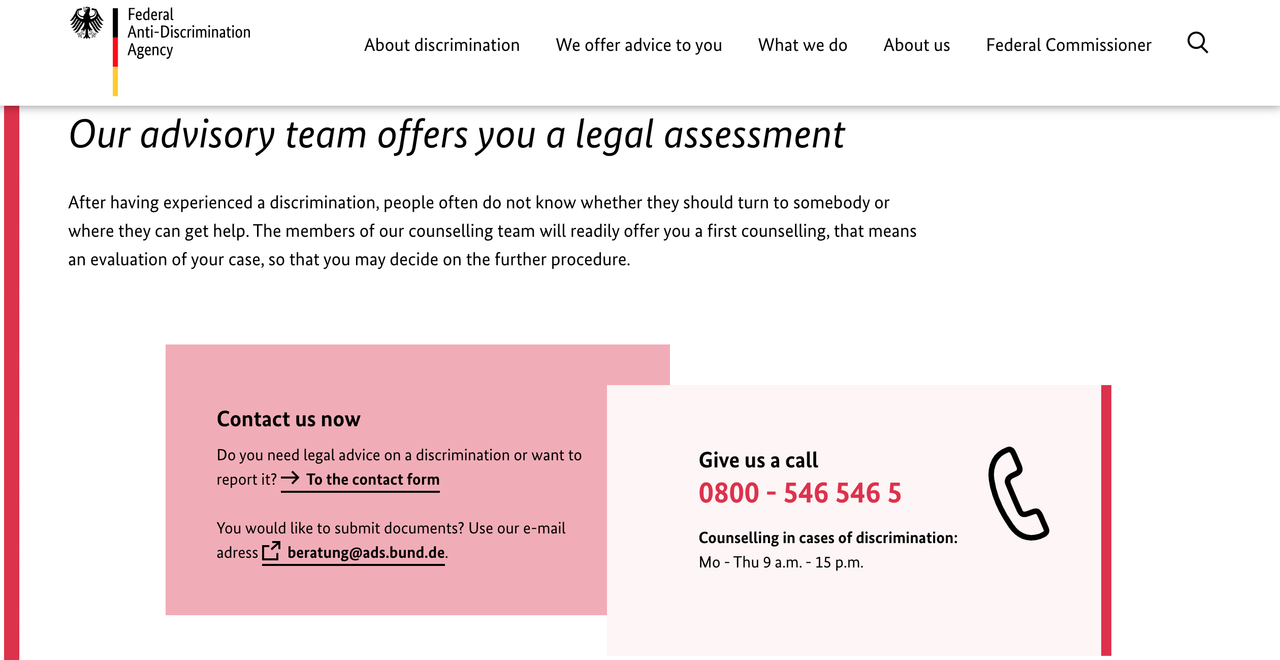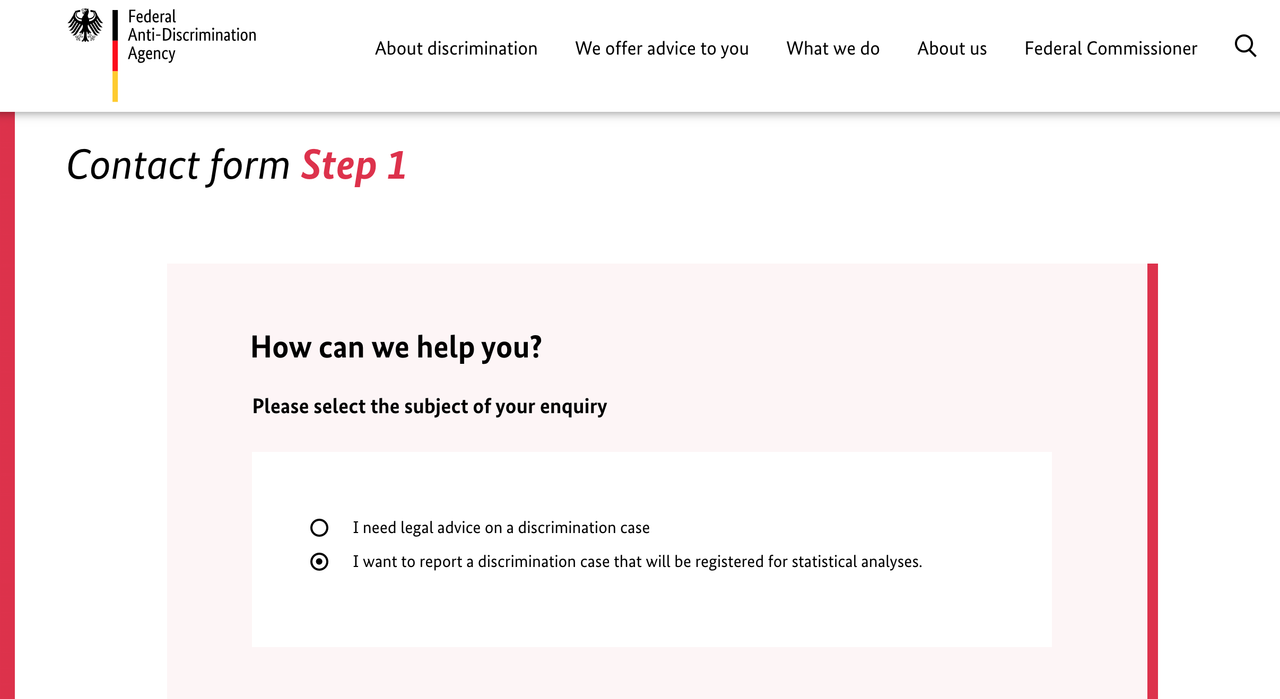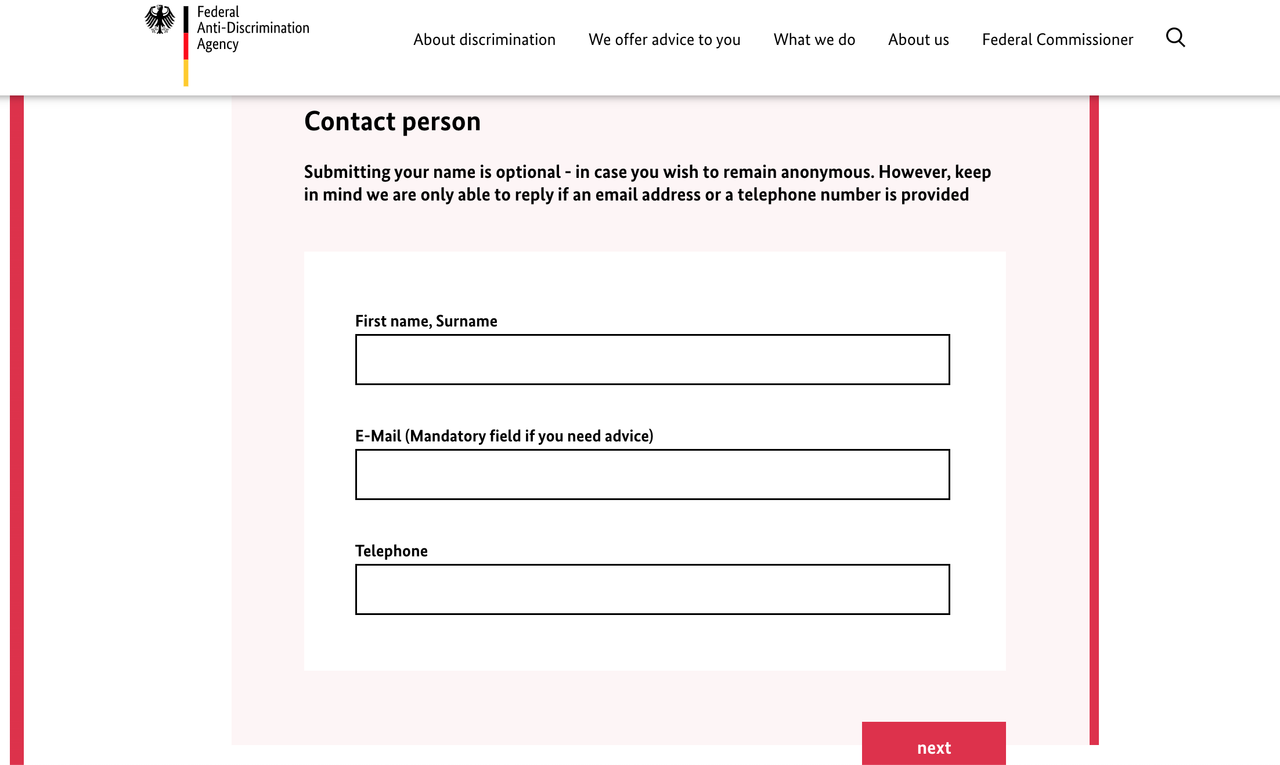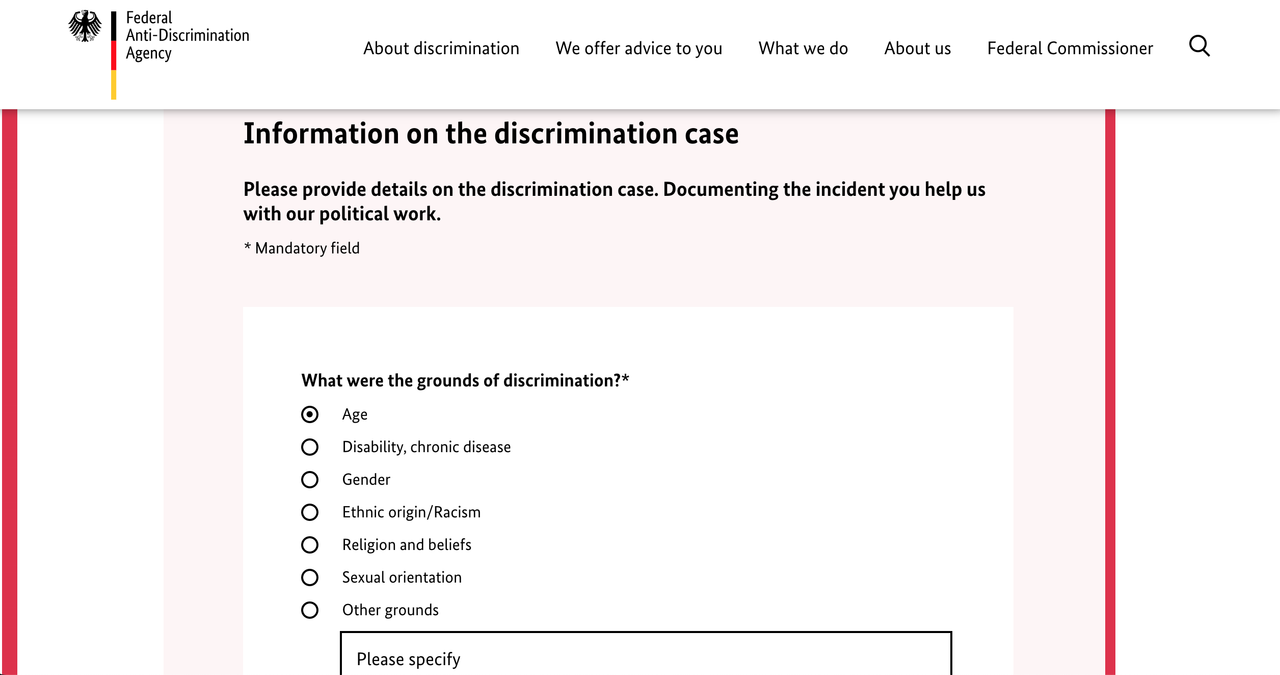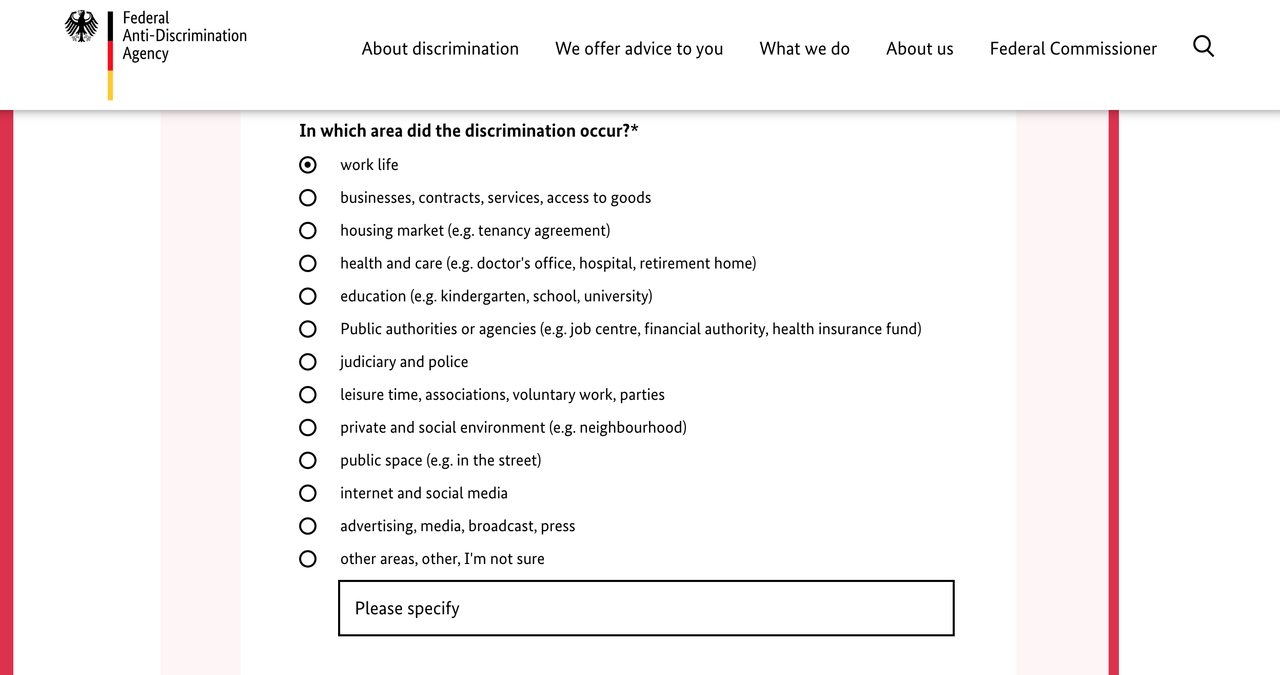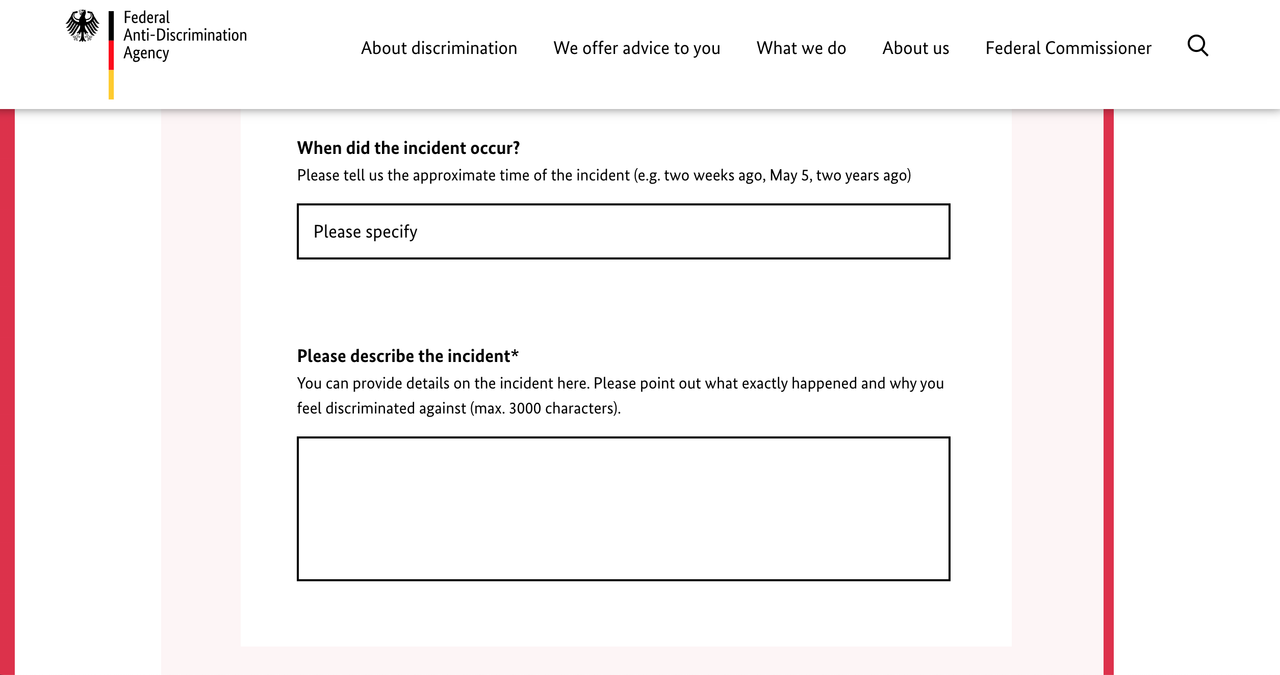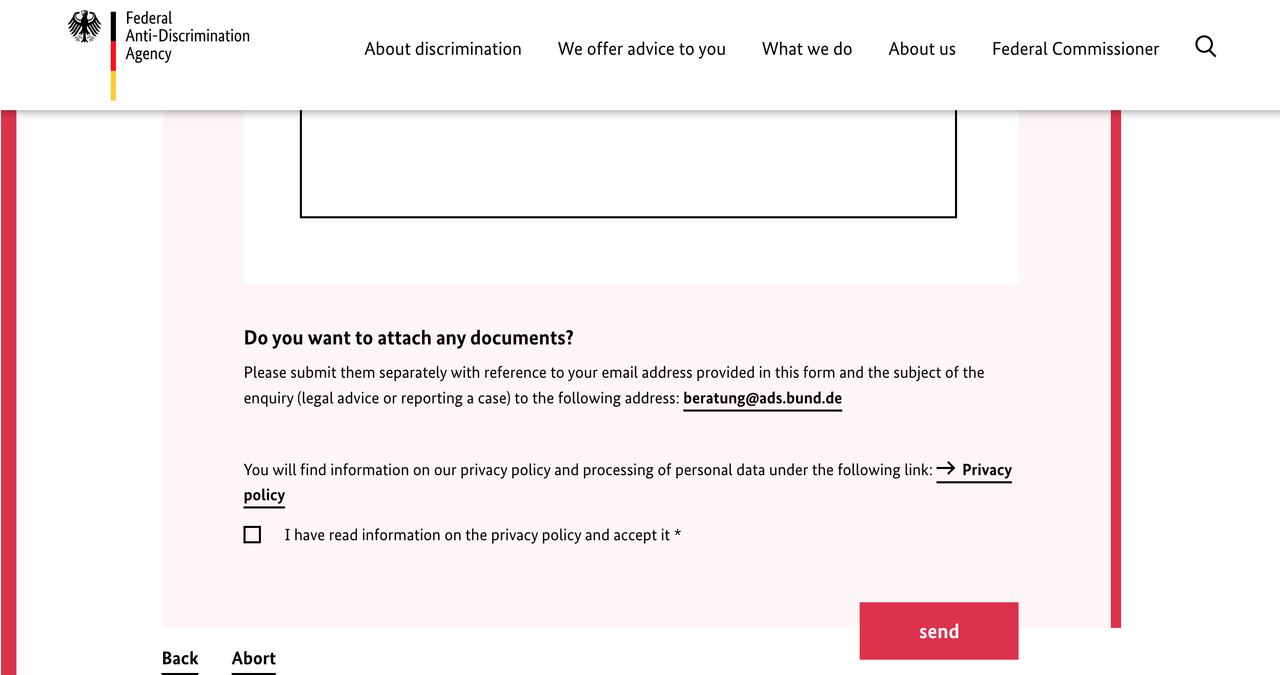
Discrimination in Germany (& what to do when you face discrimination)
Top Takeaways From This Post
Last updated on May 9th, 2023 at 04:07 pm
Today’s Germany is a multicultural society, and its diversity is growing. However, cases of discrimination in Germany are also growing. It presents itself in our day-to-day life — sometimes in subtle ways and at others in more open and direct ways. This article explains what to do when you face discrimination in Germany and how to get help.
Most foreigners, especially visible foreigners and Germans with an immigration background, at some point, have experienced some form of discrimination in Germany. Every year new reports highlight that not only violence but also structural and everyday racism remain major issues in German society.
1) Discrimination in Germany – Overview
1.1) Recent statistics and reports about discrimination in Germany
Germany has a few state-funded organisations that monitor and research the prevalence of racism and discrimination in Germany. Here are the most recent reports:
a) National Discrimination and Racism Monitor (NaDiRa)
Germany’s first antiracism commissioner, Alabali-Radovan presented the German government’s first annual report on racism in Germany earlier this year. The report shows that:
racism in Germany does not just present itself as “hate and violence,” but also day to day microaggressions, systemic exclusion from the labour and real estate markets, the lack of representation in the halls of power, police brutality and discrimination at school or in doctors’ offices.
Around 90% of respondents said they recognise that racism is a problem in Germany, and nearly 22% reported they were personally affected by it.
In 2022, official crime statistics recorded 1,042 “politically motivated” violent crimes, about two-thirds of which were racist in nature. However, the report notes, independent counselling services said they received at least 1,391 calls about physical attacks.
b) Federal Anti-Discrimination Agency (FADA)
Last year Federal Anti-Discrimination Agency (Antidiskriminierungsstelle des Bundes) presented its latest annual report about discrimination-related inquiries.
In 2021, the Federal Anti-Discrimination Agency received 5,617 requests for consultation related to discrimination grounds covered under the General Equal Treatment Act (AGG in German). This was the second-highest number of inquiries in the history of the agency.
Most experiences of discrimination in Germany were reported in the workplace (28 per cent) and in access to services and public spaces (33 per cent).
The consultation team of the Anti-Discrimination Agency also received more than 2,000 requests referencing a discriminatory ground that is not currently covered by the AGG. If those calls are added to the existing cases, the total number of requests rises to 7,750 – bringing it to a similar level as the year before (2020: 7,932 requests).


c) Further reports on discrimination in Germany.
1.2) What is the legal definition of discrimination in Germany?
Here is how discrimination is defined in German law.
The General Act on Equal Treatment (German: Allgemeinen Gleichbehandlungsgesetzes (AGG)) does not use the word discrimination, but unequal treatment, because not every kind of unequal treatment which causes disadvantage is necessarily discriminatory.
Discrimination in German laws means treating one person worse than another person due to, for instance, a disability they have or their origin.
It is considered a case of direct (or open) discrimination if a person has been treated less favourably than another person. For instance, a woman is paid considerably less than her male colleague for the same job responsibilities.
The protection against discrimination also covers cases of indirect discrimination. Such discrimination refers to rules that claim to be neutral, but they place specific persons at a disadvantage on one of the grounds specified in the General Act on Equal Treatment.
1.3) Who is protected under Germany’s General Act on Equal Treatment (AGG)?
Every person is protected from discrimination on grounds of race, ethnic origin, gender, disability, religion, belief or philosophy of life, age, or sexual orientation.
It prohibits discrimination in all areas of life: workplace and daily affairs, such as renting an apartment or getting medical treatment or accessing public areas.
1.4) What is the Federal Anti-Discrimination Agency (FADA)?
The Federal Anti-Discrimination Agency was established in 2006 on the basis of the General Act on Equal Treatment (AGG) by Germany’s Federal Ministry for Family Affairs, Senior Citizens, Women and Youth.
One of its main tasks is to offer counselling for people who have experienced or observed discrimination, such as discrimination on racist grounds or on grounds of ethnic origin, religion or ideology, sexual orientation, gender, age or disability at the workplace as well as in daily life such as shopping, banking transactions, restaurant visits or when searching for a rental flat in Germany.
1.5) What grounds of discrimination in Germany are covered in AGG?
The AGG provides protection for people who are discriminated against on the grounds of:
- race or ethnic origin,
- gender,
- religion or belief,
- disability,
- age,
- sexual identity.
in the following areas:
- employment and profession:
- self-employment
- gainful employment
- access to (and supply of) goods and services, such as:
- shopping,
- visits to restaurants or clubs,
- searching for apartments
- insurance,
- banking account, etc
The AGG also protects individuals who have been discriminated against on multiple grounds, for example, if a woman looking for a job or a flat is turned away because she comes from a migrant background and is disabled.
Recommended Reading: Getting Mental Healthcare in Germany
1.6) What can the Federal Anti-Discrimination Agency do for you?
First of all, the agency will examine whether you have been discriminated against under the terms of the General Act on Equal Treatment and whether you have any potential claims.
The counsellor of the agency cannot act as your representative in court, however, they can act as mediators. In case of dispute, the Federal Anti-Discrimination Agency can contact your opposing party, e.g. your employer or landlord, and may initialise an out-of-court settlement.
The Federal Anti-Discrimination Agency provides confidential counselling free of charge. It can also help you to find a counselling centre close to your location.
Have you ever contacted Federal Anti-Discrimination Agency for a consultation? Please help me understand your experience with them with these quick questions. It’s an anonymous survey!
2) How to Deal With Discrimination in Germany
The following section covers the most common forms of discrimination in Germany and how to deal with them after the fact.
These recommendations are based on the information shared in Protection against Discrimination in Germany: A Guide for Refugees and New Immigrants by Federal Anti-Discrimination Agency. This document is also available in a number of languages.
2.1) Workplace Discrimination in Germany
Employers in Germany are liable for any acts of discrimination by an employee against another employee at the workplace. They have the obligation to take all necessary steps in order to prevent or eliminate discrimination on one of the prohibited grounds.
If an employee experiences workplace discrimination in Germany, the employer must provide evidence of an objective reason justifying the discriminatory act. If the employer is unable to provide such justification, the individual has the right to compensation for any loss suffered, whether financial or otherwise.
The General Act on Equal Treatment (AGG) covers direct and indirect discrimination by the employer based on a person’s race, ethnicity, sex, religion and other beliefs, disability, age and sexual identity.
If you believe you have experienced discrimination at a job interview or faced workplace discrimination in Germany, or if you encounter wage discrimination, you should definitely contact Federal Anti-Discrimination Agency. Their counsellors can guide you about what you can do against discrimination and whether you have a right to damages or compensation.
2.2) Harassment at the Workplace in Germany
Workplace harassment is prohibited in Germany. It includes harassment:
- at the place of work in Germany,
- elsewhere in a work context (e.g. a company party),
- by colleagues, superiors, subordinates,
- by the employer itself,
- by third parties (such as a customer)
An employer must protect employees from harassment in the workplace and must take all necessary measures to prevent harassment from occurring.
In individual cases, the employer should investigate complaints thoroughly, issue a warning, reallocate work, transfer or dismiss the offender, or alternatively transfer the harassed employee.
An employee who has been subject to harassment at the workplace in Germany has a right to complain as soon as he/she subjectively feels harassed.
2.3) Sexual Harassment at the Workplace in Germany
Sexual harassment in the workplace is prohibited in Germany. All employees have the right to defend themselves against sexual harassment in the workplace in Germany.
Sexual harassment includes unwanted physical contact, leering, lewd looks, sexual comments, sexist jokes, or the displaying of pornographic posters.
The latest study Dealing With Sexual Harassment at the Workplace by the Federal Anti-Discrimination Agency shows that 9 per cent of all employees (women: 13 per cent, men: 5 per cent) were sexually harassed at work in the past three years.
The agency provides information and advice to people who have been harassed by offering information and counselling.
2.4) Discrimination in Germany at a Public Office
Discrimination laws in Germany apply to public authorities as well. Public authorities include police stations, job centres, immigration offices for foreigners or youth welfare centres etc; pretty much anything run by the state.
If you encounter discrimination at a public office by a public officer, you can do the following:
- Make a request to the authority‘s management requesting that you be assigned a new contact person.
- File an official disciplinary complaint against the civil servant with their superior. Some public authorities have complaints offices that you can get in touch with immediately.
- Get support from a counselling centre of the Federal Anti-Discrimination Agency.
2.5) Discrimination in Germany as a Tenant
Sometimes people also experience discrimination in Germany when looking for a rental apartment or during the tenancy period. This can also happen during the termination of the rental contract.
Discrimination laws in Germany prohibit discrimination against anyone looking for a rental apartment. This can include:
- Rejections based on the basis of ethnic origin. If the applicant is told “No foreigners!” or “No refugees!”, when viewing an apartment, this would qualify as discrimination.
- Rejections based on residence status.
- Rejections based on the lack of language skills.
- Discrimination during the rental/ tenancy duration. This might take the form of discriminatory rent increases, warnings or threats of termination of the rental contract.
If you experience rejections based on discriminatory grounds, you can contact Federal Anti-Discrimination Agency and get legal counselling.
Recommended Reading: Tenant Laws in Germany
2.6) Discrimination in Germany While Accessing Public Spaces
Unfortunately, racial profiling is a traumatic reality for many visible minorities in Germany. Often a person is denied entry to a nightclub, gym or swimming pool on the grounds of their race or religion.
If a person is denied service or entry to a public place based on poor language skills, or their residence status or nationality, this is also considered racial discrimination.
If you suspect you are getting racially profiled at a venue, but are unsure, you can try the following:
- Ask why you were refused entry.
- Does the reason for the refusal make sense? For example, were other visitors allowed in after you even though you were told that the club was already full?
- Were you required to show identification documents, an invitation or a club membership, while all other guests were allowed in without these requirements?
If you believe you have experienced such racial profiling or discrimination in Germany, you can defend yourself by taking the following steps:
- Look for support from friends or people around you.
- Make a written note of what happened. Make sure there is someone who can testify to the discrimination.
- Remain calm, even if you are frustrated. Getting aggressive in such cases could go against your case.
- Get in touch with a counselling centre of the Federal Anti-Discrimination Agency.
2.7) Discrimination in Germany When Opening a Bank Account
Every person in Germany has the right to open a bank account regardless of their origin or residence status. Discrimination laws in Germany prohibit banks from refusing anyone to open an account or deny them entry to one of their branches, without grounds for doing so.
Banks in Germany are allowed to refuse customers only in exceptional cases, such as:
- If someone already has a bank account in Germany.
- If a person has a criminal record relating to banks or financial matters.
- If the bank had already cancelled the person‘s account in the past.
Despite this, it is possible to experience discrimination when opening a bank account. If you believe you have been refused by the bank on the bases of discriminatory grounds, then you can get in touch with the Federal Anti-Discrimination Agency
Recommended Reading: How to Open a Bank Account in Germany
3) How to contact the Federal Anti-Discrimination Agency
Here is the step-by-step guide on how to contact and report a case of discrimination in Germany at the Federal Anti-Discrimination Agency:
1) Click on this link to open the contact form.
2) Choose the option that applies to you.
3) Scroll down and add contact details. This is an optional step!
4) Add information about the discriminated person.
5) Provide details of the discrimination case.
6) Add further details of the incident.
7) Describe the incident in more detail.
8) Add documents if you have any to support your case and send.
Header Image by Sheggeor laker on Unsplash
